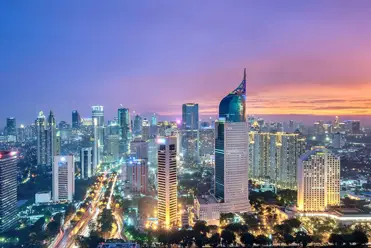Work Permit Indonesia: The Complete 2025 Guide for Talent and Employers
At Aniday, we work closely with global professionals and employers expanding into Indonesia. One of the first questions we hear is: 'How do I legally work in Indonesia?' Navigating permits, visas, and employer obligations can feel overwhelming.
We created this guide to simplify the process. If you are a candidate, you’ll learn whether you qualify for a work permit, what documents are needed, and how to avoid common mistakes. If you’re an employer, we’ll outline compliance rules, hiring timelines, and how to onboard foreign talent smoothly.
What the Indonesia Work Permit Is
In Indonesia, "work permit" is a process made up of several approvals rather than a single document. Employers first secure an approved Foreign Worker Utilization Plan (RPTKA) from the Ministry of Manpower (MoM). After approval and payment of the Foreign Worker Compensation Fund (DKP-TKA), the MoM issues a Foreign Worker Notification (often called the IMTA/Notification).
With that in place, Immigration issues a Limited Stay Visa for work (historically index C312; in 2024 the application flow moved to the Immigration MOLINA/e-Visa portal). On arrival or in-country, the worker receives an ITAS (Limited Stay Permit) commonly known as a KITAS. These permissions together authorize employment and residence.

Who Qualifies for a Work Permit in Indonesia?
Typical categories include foreign professionals hired by Indonesian entities (PT or PT PMA), technical experts on short assignments, company directors/commissioners, and intra-company assignees. Indonesia does not publish a universal minimum salary for foreign workers, but roles must be justifiable in the RPTKA and align with positions open to expatriates (certain HR/personnel roles are prohibited). Some categories are exempt from the RPTKA step (e.g., board directors/commissioners, diplomats, emergency/vocational/tech-startup production activities), though immigration steps still apply.
Application Process Step by Step
1) Employer prepares and submits the RPTKA via the MoM TKA-Online system, including company licenses (NIB), org chart, position justification, and training/knowledge-transfer plan.
2) MoM reviews and, if satisfied, approves the RPTKA.
3) Employer pays the DKP-TKA (US$100 per foreign worker per month, typically prepaid for the approved period) and receives the MoM Notification (IMTA).
4) Using the MOLINA/e-Visa portal, the sponsor applies for the work Limited Stay Visa (work purpose; historically C312; Immigration has been migrating work indices and processing to MOLINA/e-Visa).
5) Visa is issued electronically; the worker enters Indonesia and completes biometrics/registration to obtain the ITAS/KITAS (and electronic multiple re-entry permission tied to the stay permit). Key portals: TKA-Online (MoM) for RPTKA, and evisa.imigrasi.go.id for visas/stay permits.
Processing Times and Validity
Timelines vary by case and completeness. As a planning baseline in 2025: RPTKA review commonly takes several working days to a couple of weeks; after DKP-TKA payment, the work visa via Immigration’s system is often issued within a few business days; ITAS issuance is completed after entry/registration. Work ITAS/KITAS is commonly granted for 6 or 12 months (renewable), with longer ITAS validity (e.g., up to 2 or 5 years) available for certain categories per Immigration rules. Always allow buffer for additional checks.
Employer Responsibilities
-
Obtain and maintain RPTKA approval; keep job titles and worksites consistent.
-
Pay DKP-TKA: US$100 per foreign worker per position per month (prepaid; part-refunds are possible if assignments end early).
-
Hold a valid Notification (IMTA) and keep it updated; report changes (position, location, sponsor) to MoM/Immigration.
-
Ensure roles are eligible (no dual positions in one company; HR/personnel roles are restricted) and provide Indonesian counterparts/knowledge transfer where required; short-term hires (<6 months) must be insured.
-
Sponsor the visa/ITAS through the official e-Visa/MOLINA system and keep corporate data current.

Common Mistakes and How to Avoid Them
-
Treating the visa as sufficient to work: you need the full chain (RPTKA → DKP-TKA → Notification → work visa → ITAS).
-
Mis-labeling job titles or worksites compared to RPTKA/Notification—keep them aligned.
-
Overlooking DKP-TKA prepayment and invoice deadlines—nonpayment stalls approvals.
-
Assigning foreigners to restricted roles (e.g., HR) or multiple positions in one company—both are non-compliant.
-
Applying on unofficial websites—use TKA-Online for RPTKA and evisa.imigrasi.go.id for visas.
Real-World Scenarios
-
Senior Software Engineer hired by a PT PMA: Employer files RPTKA on TKA-Online with role justification and training plan, prepays DKP-TKA for 12 months (US$1,200), obtains Notification, then applies for the work e-Visa via MOLINA. The engineer enters, registers, and receives a 12-month ITAS/KITAS.
-
New Foreign Director at a PMA entity: If falling under RPTKA-exempt category (e.g., directors/commissioners), the company may skip RPTKA but must still complete immigration steps (work visa and ITAS). Verify exemption criteria before relying on it.
-
Six-month field technician assignment: Employer submits temporary/short-term RPTKA, pays DKP-TKA for six months, ensures required insurance for short-term foreign workers, secures the work e-Visa, and the technician receives a 6-month ITAS.
FAQs
-
What’s the difference between visa, ITAS/KITAS, and work permit? — The MoM approvals (RPTKA + Notification) authorize employment; Immigration’s visa lets you enter; the ITAS/KITAS is your stay permit that, together with the Notification, lets you live and work in Indonesia.
-
How much is DKP-TKA? — US$100 per foreign worker, per position, per month, typically prepaid for the approved period. Partial refunds are possible if the assignment ends early.
-
How long does the work e-Visa take? — After payment/clearances, work visas are often issued within a few working days; total end-to-end timing depends on RPTKA review and corporate data verification.
-
How long is the KITAS valid? — Commonly 6–12 months for work, renewable; longer ITAS validity exists for certain categories per Immigration.
-
Do directors/commissioners need an RPTKA? — Certain board roles are exempt from the RPTKA step, but immigration requirements (visa/ITAS) still apply.
-
Are any roles off-limits to foreigners? — Yes; for example, HR/personnel functions are restricted. A foreign worker also cannot hold two positions in the same company.
-
Can I convert or extend in-country? — ITAS extensions are possible; keep sponsorship and job details consistent and renew the Notification as required. Check current rules on the e-Visa site.
-
Which websites are official? — RPTKA is handled on MoM’s TKA-Online; visas/stay permits are on the official Immigration e-Visa portal (evisa.imigrasi.go.id).
-
What happens if my company hires without proper permits? — The MoM has increased enforcement; non-compliance can trigger penalties and reputational risk.
-
Do short-term workers need insurance? — Yes, for assignments under six months, employers must register foreign workers with insurance per MoM guidance.
How Aniday Helps
Whether you’re bringing in a single specialist or scaling a full team in Indonesia, Aniday can help:
-
Headhunting: Source and assess Indonesia-ready talent across engineering, product, and operations.
-
Employer of Record (EOR): We hire talent on your behalf in Indonesia and manage RPTKA/DKP-TKA/Notification coordination with your chosen immigration counsel.
-
PEO & Compliance: Payroll, benefits, and leave administration, aligned to Indonesian labor norms.
-
Global Payroll: Consolidated payroll with compliant Indonesian calculations and reporting.
Talk to us to tailor a hiring and immigration plan for your case.
Conclusion
Securing a work permit in Indonesia is often the key step to building a compliant and sustainable career or workforce. At Aniday, we make the process clearer and safer for both talent and employers—so you can focus on growth instead of red tape.
Aniday's HR Services
Headhunting Service
Find and recruit quality candidates in just 1 week! Supported by 40,000 experienced headhunters in IT, Finance, Marketing… capable of recruiting in any region.
Headhunting Service ➔Employer of Record (EOR) Service
On behalf of your business, we recruit employees and handle payroll without the need to establish a company in markets such as Vietnam, Singapore, Malaysia, India, Indonesia…
Employer of Record (EOR) Service ➔